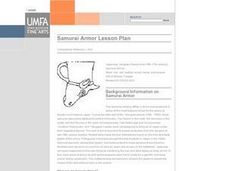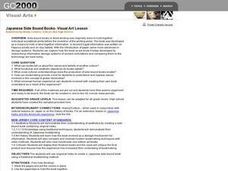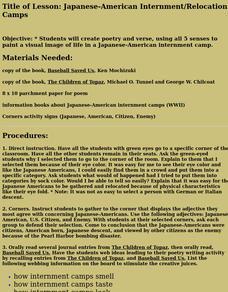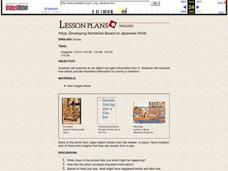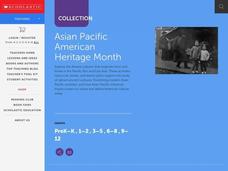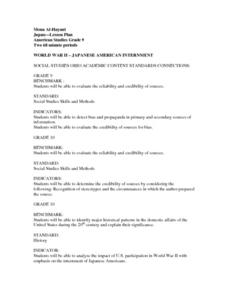Curated OER
What to Wear: Career Day! Suit of Armor From Japan
Students understand that some jobs require workers to wear special clothes or a special suit. For this art appreciation lesson, students observe the Suit of Armor and discuss how a samurai is requires to wear armor to work. Students pick...
Curated OER
Japanese Folktales
Students read both Japanese and American folktales and respond to teacher generated questions. They compare the folktales and determine if there is a lesson to be learned. They draw story card to retell the story to the class.
Curated OER
Samurai Armor Lesson Plan
Students create origami. In this visual arts lesson, students design and create origami samurai helmets that feature Japanese patterns and textures in the style of those worn by samurai.
Curated OER
Patriotism Reflected in Art and Literature (part A)
Students explore pre-World War II Japanese art. For this patriotism lesson, students analyze Eternal Fuji and Red Sun by Yokoyama Taikan. Students discuss the techniques used to create the painting as well as the symbolism behind it....
Curated OER
Japanese Side Bound Books
Students create Japanese side-bound books using traditional bookbinding methods and original Haikus in this Art lesson for the High School classroom. The lesson can be modified for any grade level and can be accomplished in two class...
Curated OER
Transportation Lesson
Students practice using transportation vocabulary in a foreign language. In this language arts lesson plan, students utilize the vocabulary terms for locations in order to give directions and find a specific place. Students...
Curated OER
Japanese-American Internment/Relocation Camps
Students create poetry and verse, using all 5 senses to paint a visual image of life in a Japanese-American internment camp.
Curated OER
Changes in Western Art: From Realism To Cubism"
Middle schoolers discover the influences of mid 19th and early 20th century art styles: Realism, Impressionism, Post / Neo Impressionism, Fauvism, Cubism through an analysis of styles, subject matter, and media.
Curated OER
DEVLOPING NARRATIVES BASED ON JAPAPNESE PRINTS
Students examine an art object and gain information from it. Students examine how artists provide important information to convey a narrative.
Alabama Learning Exchange
Origami Geometry
Origami is an excellent way to combine Japanese culture, art, and geometric shapes into one engaging instructional activity! Scholars begin by listening to the story Sadako and the Thousand Paper Cranes and learn the origin of...
Asian Art Museum
Create Your Own Samurai (Breastplate) Armor
Your class is going to love this activity. They get out their rulers, cardboard, and paints as they make Samurai breastplates. The simple art lesson lends itself to many different subjects such as, math/measurement, world history, and...
Curated OER
My Secret War: The WWII Diary of Madeline Beck: Lesson 6
Fifth graders explore women's rights by discussing the events of WWII. In this American work force lesson, 5th graders identify the events that led to World War II and how women helped fight the war through non-violent efforts. Students...
Curated OER
Japanese Abstract Art And The Impressionist Movement
High schoolers study several examples of Japanese abstract art and how this style impacted the Impressionist movement of the 19th century. This activity includes ideas for student-created sketchbooks.
Curated OER
Dorothea Lange and the Relocation of Japaneses Americans
Pupils analyze Dorothea Lange's photographs about Japanese American relocation. In this art and history lesson, students analyze a photograph about the relocation of Japanese Americans. Pupils discuss the impact of governmental decisions...
Curated OER
Japanese American Baseball in the Camps
Students study Japanese American internment camps. In this American history lesson, students compare and contrast the camp internees' experiences with with team sports-related challenges students have encountered. Students discuss team...
Curated OER
World War II: Japanese-American Internment
Fifth graders read "The Bracelet" by Yoshiko Uchida and use it as a catalyst to discuss the internment of Japanese-Americans during World War II. They debate the morality of the internment, create Venn diagrams and chart important events...
Curated OER
Looking at French Decorative Arts: Makers of Nothing, Sellers of Everything
Students imagine they are a 'marchand-mercier' (or salesman) and write a persuasive letter to sell French items. In this art analysis lesson plan, students identify the role of a 'marchand-mercier' and write a three-paragraph letter to...
Indiana University
British Literature Restoration Unit: The Pillow Book – Sei Shonagon
First drafted in the year 996, The Pillow Book contains reflections of those met by a lady-in-waiting in the Japanese court. A brief summary, historical context, and discussion questions are provided on the first two pages. Then, two...
Curated OER
Kirigami: The Ancient Art of Paper Cutting
Young scholars perform inquiry into the ancient art of Kirigami. The research provides a context for the lesson and how it is related to History. Students also appreciate the art for the sake of its contribution to culture.
Curated OER
A First Look at the Garden
For any teacher who is planning a field trip to Missouri's Botanical Garden, this lesson packet is a must-have! In it, young learners engage in pre-visit activities so they will be prepared to get the most out of their trip. There are...
National Endowment for the Humanities
Hamlet Meets Chushingura: Traditions of the Revenge Tragedy
Students read texts, view film and video and conduct research in an analysis and comparison of Shakespeare's "Hamlet" and the Kabuki piece "Chushingura". They focus their analysis on the theme of revenge.
Curated OER
Molded Clay Faces
Artists create clay masks using pre-formed molds, clay, glitter, feathers, gems, and paint. The expressive qualities of clay are perfect for creating many different types of face masks, from Mardi Gras glitter to Japanese Kabuki to...
National Endowment for the Humanities
The World of Haiku
Students complete a study of Japanese culture through haiku. They read and interpret haiku poetry and write haiku of their own.
Denver Art Museum
Alien Beauty
"Beauty is in the eye of the beholder," is a popular phrase in our society. The instructional activity here puts the phrase to the test as pupils explore what truly is beautiful through a study of some Japanese folk art. A careful...




